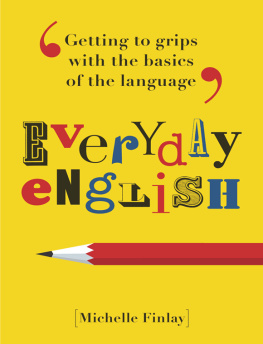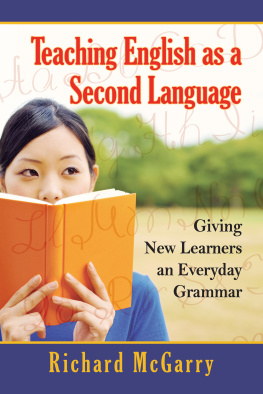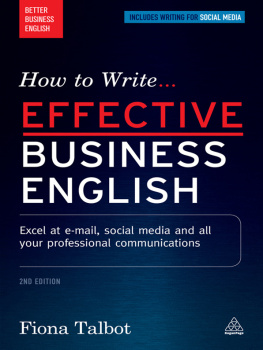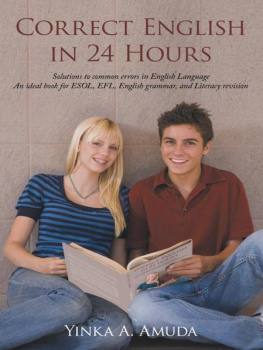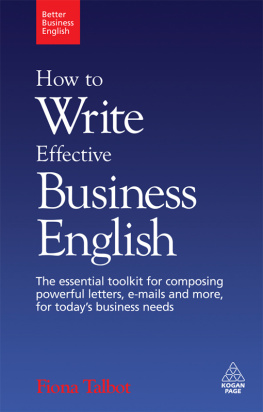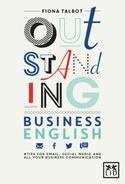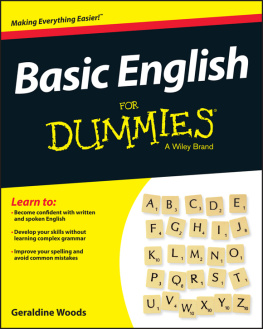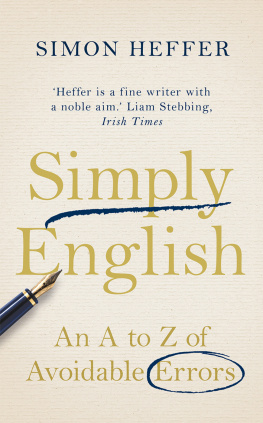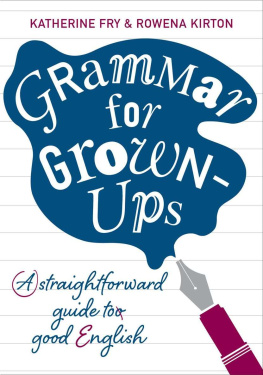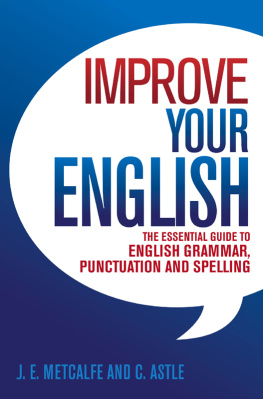
First published in Great Britain in 2011 by
Michael OMara Books Limited
9 Lion Yard
Tremadoc Road
London SW4 7NQ
Copyright Michael OMara Books Limited 2011
All rights reserved. You may not copy, store, distribute, transmit, reproduce or otherwise make available this publication (or any part of it) in any form, or by any means (electronic, digital, optical, mechanical, photocopying, recording or otherwise), without the prior written permission of the publisher. Any person who does any unauthorized act in relation to this publication may be liable to criminal prosecution and civil claims for damages.
A CIP catalogue record for this book is available from the British Library.
Papers used by Michael OMara Books Limited are natural, recyclable products made from wood grown in sustainable forests. The manufacturing processes conform to the environmental regulations of the country of origin.
ISBN: 978-1-84317-566-7 in hardback print format
ISBN: 978-1-84317-680-0 in EPub format
ISBN: 978-1-84317-681-7 in Mobipocket format
1 2 3 4 5 6 7 8 9 10
Cover design by Patrick Knowles
Designed and typeset by Ed Pickford
Illustrations by Andrew Pinder
www.mombooks.com
For Michael: words fail me
Contents
G ood English is everywhere. It is not the preserve of the BBC or of our greatest writers. It may be heard in everyday conversation, and can be found in magazine or newspaper articles, in press releases, political speeches, instruction manuals or advertisements, and elsewhere.
Sadly, the opposite is also true. English is often brought to its knees by tabloid headlines, company reports, websites, DVD subtitles and also by press releases, instruction manuals and advertisements
None of us is immune to the odd mistake; very few of us can hold up our hands and say we never make an error or find ourselves hesitating over a word or a point of grammar. The problem is that if standards around us fall, we tend to fall with them. There is something about seeing a word or phrase in print that gives it credibility, whether it deserves it or not, and if we see the same mistake over and over again, we begin to see it as acceptable.
You might ask if it matters that we make mistakes in grammar, that we punctuate badly and confuse our tenses. I believe it matters a great deal. Civilization is based on communication; faulty communication leads to misunderstanding and can impede progress. As the world has developed, so has language, and quite rightly. Where would we be without new words for scientific discoveries, new technology and new concepts? Unfortunately, this has introduced a whole raft of new errors and abuses into the English language. Of course, we must move forward, but we should try to do so without losing any of the clarity and scope for expression that a good grasp of the language provides.
English is one of the richest, most colourful and most subtle languages in the world. To speak or write good English plain, lucid, jargon-free English to have mastery of the language, is to have style.
English speakers are blessed with the good fortune to share their language with some of the finest writers and orators of all time. As well as including hundreds of everyday examples of correct English, I have turned to great writers, from Jane Austen to Oscar Wilde, for inspiration.
Imitating such masters, however, this is more easily said than done. This is where this book comes in. Everyday English is designed to help native and non-native English speakers alike gain command of the language. Beginning with the letters of the alphabet, the book works its way, little by little, from the building blocks of written and spoken English spelling, word order, punctuation, parts of speech to tone of voice, pitfalls to avoid, and tips to ensure clarity, and even elegance.
T he English language is a complex tapestry of extraordinary variety and colour. In order to appreciate how it has developed, we need to look at early British history and the ways in which successive invading forces exerted a powerful influence on the language.
When the Romans came to Britain in the mid-first century BC , they found a land inhabited like much of Western Europe, including France and Germany by various Celtic tribes, collectively known as Britons.
The Romans, under the command of Julius Caesar, invaded in AD 43, and brought with them their alphabet, formed from those of the Semitic, Egyptian Phoenician and Greek civilizations. The Latin alphabet consisted of twenty-three letters our contemporary alphabet without the j (Julius was Iulius, and so on), u (the v easier to carve in stone was used for that sound) and w (see later).

By the end of the third century AD , most Romans had left Britain, which was now at the mercy of new invaders Angles, Saxons and Jutes from Germany and Denmark. The Celts were driven away to the far-distant corners of Britain: Scotland, Ireland, Wales and Cornwall (where Celtic languages still survive to this day).
The invaders brought with them a runic alphabet and spoke a version of German that blended with the Celtic/Roman language already in existence in Britain to create Anglo-Saxon or Old English. In 597, however, Saint Augustine arrived in Kent on a mission from Pope Gregory to convert the people of Britain to Christianity. His success meant that, in order to read and study the Bible and other Christian texts in Latin, the Anglo-Saxons began to adopt the Roman alphabet, modifying it to suit their own requirements.
In 789 came the Viking invaders, and the English adopted many new words from the Old Norse: gap, ill, mire, reindeer, root, scowl, skull, sky, to mention a handful.
The Norman invasion of 1066 brought with it yet another influx of words. A two-tier language developed, with Norman French words being used by the ruling class, while their Anglo-Saxon equivalents were used by the natives. For this reason, we have a sheep or a cow (Anglo-Saxon) in the field but the more refined mutton or beef (from the French mouton and buf) at the table; the farmers daughter wore a frock, but the lady of the manor wore a robe. Similarly, French tended to be used in law thus we have words like mortgage (literally meaning dead pledge) or parole (spoken word).
In the years following the Norman invasion, the last of the runic Old English letters gradually disappeared, replaced by letters from the Latin alphabet. Old English had given way to Middle English. During this period the three final letters joined the alphabet as we know it today: j was adapted from i when sounded as a consonant similar to a soft g; v as a consonant came to be distinguished from the vowel u; and w, with its similar sound, came into being as double-u (although the upper case form actually appears as double-v). The modern alphabet was complete.

N ouns, as we know from school, are naming words. Things, people, places, chemical elements, music, concepts, emotions all these are nouns. They form the majority of the words learned by a baby nouns come first, then a few verbs are thrown in.
You may not need to be reminded, then, that they are usually divided into two main categories:
Next page
